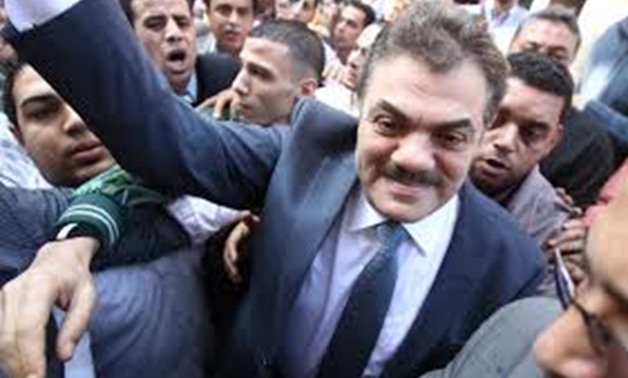
The head of the Wafd Party el-Sayyid el-Badawi - AFP
CAIRO - 26 January 2018: El-Sayyid el-Badawi Shehata, known as el-Sayyid el-Badawi, is the incumbent president of the Wafd Party. He was chosen by the liberal-oriented Wafd Party on Thursday to run for the upcoming presidential election due to take place in March.
Badawi’s bid came only one day after President Abdel Fatah al-Sisi submitted his candidacy papers to the National Election Authority (NEA) to run for a second term, lawyer Khaled Ali announced his withdrawal from the presidential bid and former Military Chief of Staff Sami Anan was removed from the voters’ database and summoned by the Armed Forces.
Badawi, born in 1950, was raised in the Tanta governorate (94 kilometers north of Cairo), before moving to Alexandria where he graduated from the Faculty of Pharmacy in 1973. Badawi has also owned many media outlets through his career.
Egypt Today sheds the light on the new competitor in the second presidential election since the ousting of Muslim Brotherhood-affiliated President Mohamed Morsi.
Badawi’s political interaction
Badawi first joined the Wafd Party in 1983 and became secretary general of the party in 2000. He was elected as the party’s leader on May 28, 2010, and was reelected in 2014.
In May 2015, the party was hit by strife sparking a feud between rival factions. By the end of the month, new elections were held; Badawi remained and his supporters won most of the new spots on the council.
During the 18-day revolution in 2011, Badawi did not make any action; however Hayat TV, owned by Badawi, was hostile to the protesters and backed the Mubarak regime.
“No one can deny the legitimacy of Mubarak’s rule,” Badawi stated a few months prior to the January 25 Revolution according to Al-Masry Al-Youm newspaper.
During the 2014 presidential election, President Sisi declared that he did not want to establish a party supporting him in the poll. A group of parties, among them Wafd, announced in March 2014 that they would stand behind him in the presidential election and form his partisan backer in the parliament.
“Sisi is the man for the current stage,” Badawi told Egypt Today on January 19, 2018. “The Wafd Party seeks to take part in 2022 presidential election.”
Badawi-Brotherhood relationship
In the 2010 parliamentary elections, most opposition parties, including Wafd agreed to boycott the poll, but Wafd’s leaders changed their mind and began fielding candidates. Soon afterward, the Muslim Brotherhood and others followed suit.
Wafd had already won two seats in the first round, but Badawi decided to boycott the run-offs in protest of what he described as electoral fraud. He added that the Wafd Party “wants to stand by the people and not by a deceitful parliament.” Many of the party’s candidates who qualified for the run-off races disregarded Badawi’s directions and participated anyway.
Under the chairmanship of Badawi, Following the January revolution in 2011, the Wafd Party launched its alliance (the National Democratic Alliance for Egypt) with the Freedom and Justice Party (FJP), the political wing of the Brotherhood, to present a joint list of candidates for the 2011 parliamentary election.
After a wave of criticism against the party for cooperating with Islamists, Wafd decided to participate in the elections independently, and left the Democratic Alliance for Egypt.
Badawi, under the umbrella of the Wafd Party, backed the ousting of MB-affiliated Mohamed Morsi and welcomed the dissolving the FJP and the Brotherhood group.
“The June 30 Revolution managed to protect the state institutions and kept its identity,” stated Badawi, “it liberated the national decision from subordination to foreign powers.”
Badawi as a media figure
In 2010, Badawi and his fellow Wafdist Reda Edward bought the daily Al-Dostour newspaper. He fired its editor-in-chief Ibrahim Eissa, causing fierce criticism directed towards the two owners. As a result, many of the Wafd Party members reigned, accusing Badawi of doing the “dirty work” of the Mubarak regime that did not like Eissa’s press policy at that time.
On the same day that Eissa was fired, Badawi sold his share in Al-Dostour as an attempt to distance himself from criticisms.
Badawi is the incumbent editor-in-chief of the partisan Wafd daily newspaper.
In September 2017, Badawi sold Al-Hayat satellite network with LE 1.4 billion, after falling in huge debt which forced the Egyptian concerned authorities to stop the broadcast of the network until it settled its financial status.

Comments
Leave a Comment